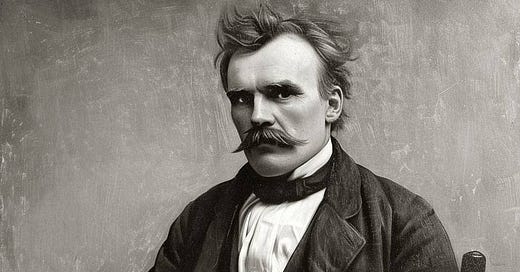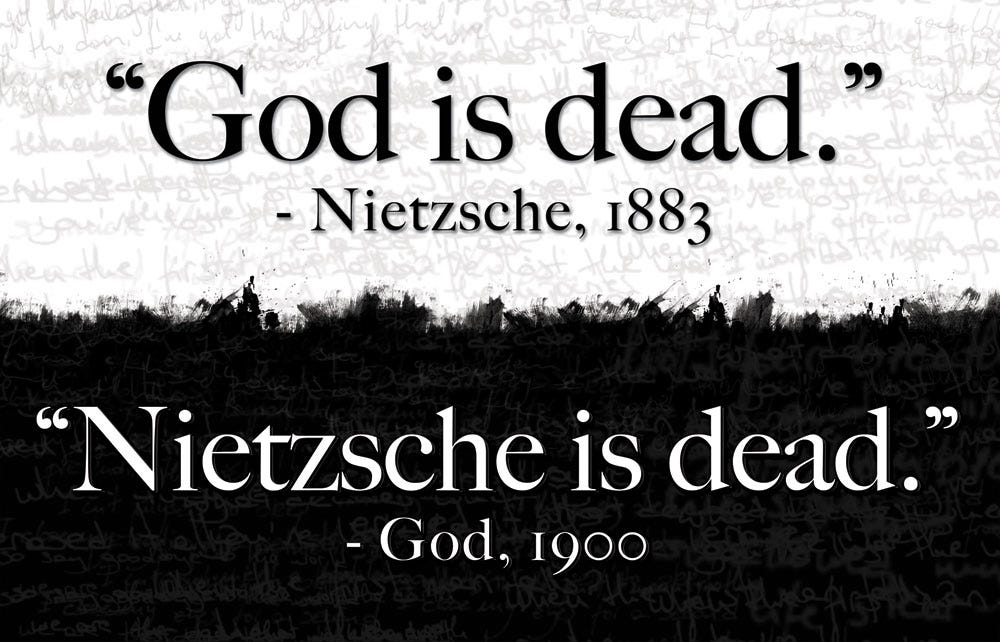Today’s parable is unique to Matthew. This is notable, because Matthew overlaps with Mark and Luke so much that scholars have theorized an entirely different document, called simply “Q” (allegedly from the German1 word Quelle—“source”). It’s accepted by a lot of people, but the thing is, there is literally no evidence for Q.
There’s no quotes from it. There’s no reference to a Gospel that we don’t have a copy of. Nothing. It’s just a thing “scholars” made up in the 1800s because they noticed a bunch of lines that existed in Matthew and Luke but not Mark. Up until that point, everyone basically thought Luke took notes from Matthew, since Luke says he took notes from eyewitness sources.2
All of this would just be mildly interesting, except that anti-Christians will use the “existence” of Q to claim that anything not found in Mark and (again, the entirely hypothetical) Q must’ve been made up by the later Church—
Reading 1
1 Cor 1:17-25
Brothers and sisters: Christ did not send me to baptize but to preach the Gospel, and not with the wisdom of human eloquence, so that the cross of Christ might not be emptied of its meaning.
The message of the cross is foolishness to those who are perishing, but to us who are being saved it is the power of God. For it is written: I will destroy the wisdom of the wise, and the learning of the learned I will set aside.
Where is the wise one? Where is the scribe? Where is the debater of this age? Has not God made the wisdom of the world foolish? For since in the wisdom of God the world did not come to know God through wisdom, it was the will of God through the foolishness of the proclamation to save those who have faith. For Jews demand signs and Greeks look for wisdom, but we proclaim Christ crucified, a stumbling block to Jews and foolishness to Gentiles, but to those who are called, Jews and Greeks alike, Christ the power of God and the wisdom of God. For the foolishness of God is wiser than human wisdom, and the weakness of God is stronger than human strength.
Death on a cross seems a lot like losing, say the wise. But how wise are they really? How long does their wisdom last?
Responsorial Psalm
Ps 33:1-2, 4-5, 10-11
R. (5) The earth is full of the goodness of the Lord.
Exult, you just, in the LORD;
praise from the upright is fitting.
Give thanks to the LORD on the harp;
with the ten stringed lyre chant his praises.
R. The earth is full of the goodness of the Lord.
For upright is the word of the LORD,
and all his works are trustworthy.
He loves justice and right;
of the kindness of the LORD the earth is full.
R. The earth is full of the goodness of the Lord.
The LORD brings to nought the plans of nations;
he foils the designs of peoples.
But the plan of the LORD stands forever;
the design of his heart, through all generations.
R. The earth is full of the goodness of the Lord.
Can created everything, and the world is good. Humans make plans for evil, selfishness, and greed. Our plans will ultimately, in the end times, come to nothing, but God’s plan will last. Which is good, since God’s plan is love.
Alleluia
Lk 21:36
R. Alleluia, alleluia.
Be vigilant at all time and pray,
that you may have the strength to stand before the Son of Man.
R. Alleluia, alleluia.
This is hard advice to follow, as we’re about to see. But it’s still good to have goals, even if we know they’re unattainable.
Gospel
Mt 25:1-13
Jesus told his disciples this parable: "The Kingdom of heaven will be like ten virgins who took their lamps and went out to meet the bridegroom. Five of them were foolish and five were wise. The foolish ones, when taking their lamps, brought no oil with them, but the wise brought flasks of oil with their lamps. Since the bridegroom was long delayed, they all became drowsy and fell asleep. At midnight, there was a cry, 'Behold, the bridegroom! Come out to meet him!' Then all those virgins got up and trimmed their lamps.
The foolish ones said to the wise, 'Give us some of your oil, for our lamps are going out.' But the wise ones replied, 'No, for there may not be enough for us and you. Go instead to the merchants and buy some for yourselves.'
While they went off to buy it, the bridegroom came and those who were ready went into the wedding feast with him. Then the door was locked. Afterwards the other virgins came and said, 'Lord, Lord, open the door for us!' But he said in reply, 'Amen, I say to you, I do not know you.' Therefore, stay awake, for you know neither the day nor the hour."
What’s interesting about this story is, all ten virgins fall asleep. They’re not physically capable of being ready at all times, always. We human beings are limited.
We can’t be ready, but we can be prepared.
Prayer and the sacraments are how we prepare ourselves. Frequent confession, regular communion—these are the ways we keep oil in our lamps. Then, when someone needs our to help light their way, either by charity or prayer or even just sympathy, our lamps will be full.
We may not even recognize the bridegroom in our midst. In the very next parable after this,3 Jesus tells us “Amen, I say to you, whatever you did for one of these least brothers of mine, you did for me.” The good we do now is for Jesus as well as our brothers and sisters in this world.
Most people don’t think Matthew was written by the Apostle himself, rather by one of his disciples, but that’s neither here nor there.






